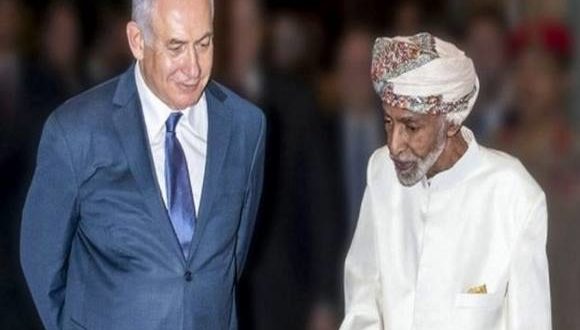By Abdel Bari Atwan
The normalisation blowskeep coming. First,Israeli Prime Minister Binyamin Netanyahu visits Muscat and is greeted most cordially. Then, Israeli Culture Minister Miri Regev tours the Abu Dhabi mosque dedicated to the late Sheikh Zayed, who led the Arab oil embargo in solidarity with the heroes of the October 1973 war and made the historic declaration that ‘oil is not more precious than blood’. Meanwhile, the Israeli national anthem is played in Doha to salute a gymnastics team taking part in a sports tournament there. And after all that, at an international conference in Oman, Israeli Transport Minister Yisrael Katz unveils plans for a railway linking the Palestinian port of Haifa to Jordan, Saudi Arabia and the other Gulf states, and explains the abundant political and economic benefits that will accrue from this normalisation train.
We hardly had time to recover from the shock of Netanyahu’s visit to Muscat, and those of his ministers and sports teams to Abu Dhabi, Dubai and Doha, before we were presented with this new ‘peace train’. The announcement was deliberately timed to coincide with the coming into force of the second phase of US sanctions against Iran, leader of the resistance axis. The Israelis promoting this project, with American support, made a point of stressing it would help the Gulf states in their endeavour to confront the threat posed by Iran to the region’s security and stability.
The Israelis see the Arab world’s current enfeebled state as providing them with an opportunity to reach the sources of the Arabs’ oil and control the Gulf states and their economies. The pretext is that these countries need access to the Mediterranean via Haifa. But the real purpose is to establish a presence there, assert their leadership of the region, and set the stage for the nascent ‘Sunni Arab Nato’. Is it a coincidence that this railway proposes to connect the capitals of this alliance’s members?
We do no understand why these states need access to the Mediterranean, when they have ample access to the Arabian Sea, the Red Sea and the Gulf of Aqaba. And if they do indeed need it, why must it be via Haifa rather than, for example, Beirut, Latakia or Banias?
The ill-fated Arab Peace Initiative has been reduced to a footnote in the so-called Deal of the Century. And it has been up-ended: with normalisation coming first, second and third, and the main component – the establishment of a Palestinian state with Jerusalem as its capital – not being implemented at all.
Jordan, and we say this with bitterness, will be the Trojan Horse that is used to implement this normalisation plan if it is put into effect, as it is already involved in two normalisation projects: the proposed canal to link the Red, Dead and (later) Mediterranean seas; and the 15-year $15bn gas deal with Israel. What Jordanian officials do not appreciate is that if these plans go ahead they well ultimately be to their detriment and that of their country and its identity. Jordan after them will not be the same as Jordan before them, if it remains at all.
This is no ‘peace train’ but a train of capitulation to Israeli plans aimed at dominating the region, its oil and its economies, destroying the Arabs’ national identity, and turning them into servants, subordinates and sentries of the Zionist enterprise. That is the ultimate humiliation.
Go ahead and celebrate the presence of the racist Israeli minister who likened your prayer calls to the barking of dogs. Roll out the red carpets for Netanyahu and his ministers. Play the Israeli national anthem, learn the words and tune, and sing along heartily behind the Israeli athletes. And listen carefully to Yisrael’s Katz’s briefing on the new normalisation train project.
But also keep in mind that the Arab and Islamic peoples have not died and will not die, and the day of reckoning will come perhaps not before long.
 Geostrategic Media Political Commentary, Analysis, Security, Defense
Geostrategic Media Political Commentary, Analysis, Security, Defense





